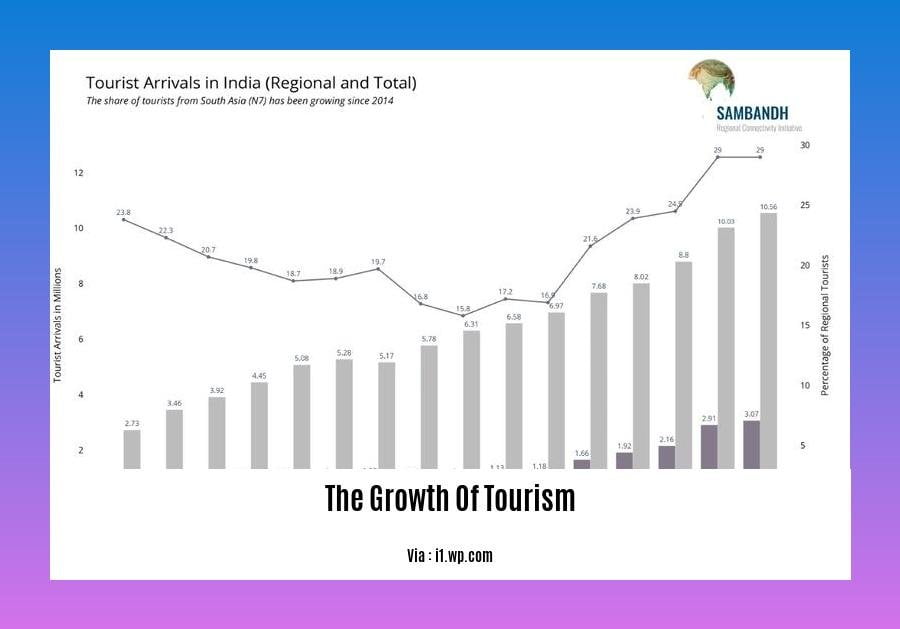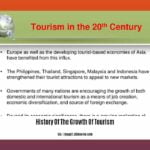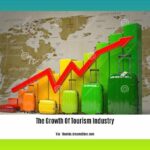The Growth of Tourism: A Transformative Force in the Modern World is a phenomenon that has had a profound impact on societies worldwide. Fueled by globalization, technological advancements, and rising disposable incomes, the tourism industry has emerged as a major economic driver and a catalyst for cultural exchange and understanding.
Key Takeaways:
- Tourism growth involves an increase in international tourist arrivals and spending.
- Tourism is a rapidly expanding economic sector that promotes economic development.
- Factors driving tourism growth include increased leisure time, greater awareness, improved life expectancy, rising affluence, and affordable travel.
- Challenges to tourism growth include the pandemic, sustainability concerns, and digitalization.
The Growth Of Tourism
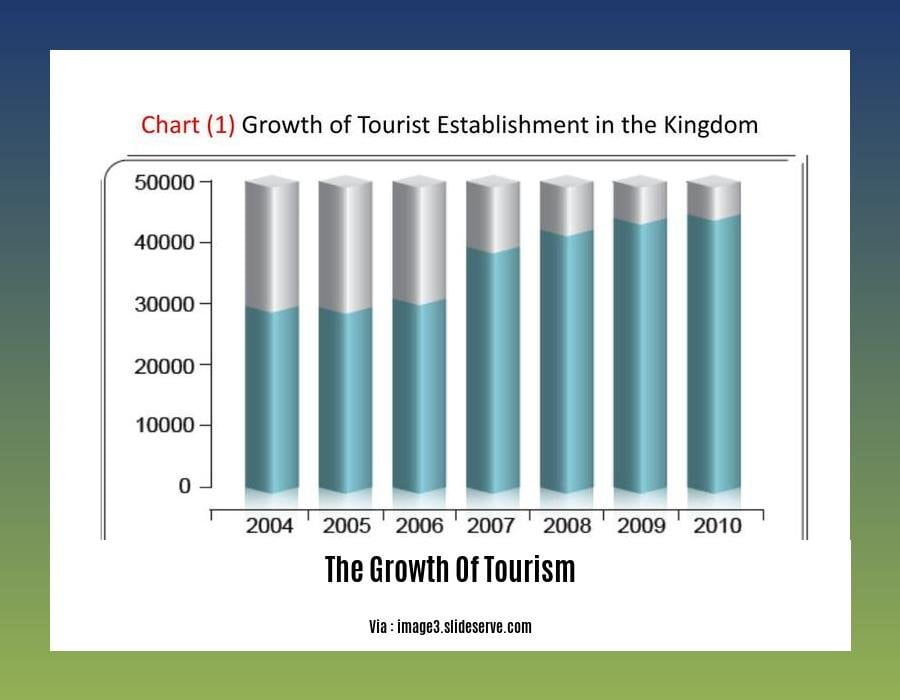
With the growth of tourism, the world has been shrinking. The number of people traveling for leisure or business has been on the rise for decades, and shows no signs of slowing down. In 2019, there were 1.5 billion international tourist arrivals, and that number is expected to reach 1.8 billion by 2030.
This growth has been driven by a number of factors, including increased leisure time, greater awareness of different cultures, increased life expectancy, greater affluence, and travel affordability.
The growth of tourism has had a significant impact on the global economy. In 2019, tourism generated $2.3 trillion in revenue for the global economy, and that number is expected to reach $3.2 trillion by 2030. Tourism is now one of the fastest-growing industries in the world.
The growth of tourism has also had a significant impact on the social and cultural fabric of societies around the world. Tourism has helped to break down barriers between different cultures, and has led to a greater understanding of different ways of life.
Of course, the growth of tourism has also had some negative impacts. One of the biggest challenges facing the tourism industry is the impact of travel on the environment. Tourism can contribute to pollution, congestion, and noise. It can also damage natural resources and cultural sites.
Another challenge facing the tourism industry is the impact of digitalization. The rise of online booking platforms has made it easier for people to travel, but it has also made it more difficult for traditional travel agents to compete.
Additionally, the growth of tourism has contributed to the following:
- The growth of tourism has created jobs and boosted economic growth in many destinations.
Pros of Tourism: - Provides employment opportunities
- It contributes to tax revenues
- Promotes cultural exchange.
Cons of Tourism:
* Can lead to environmental degradation.
* Can strain infrastructure and resources.
* Potential for negative social impacts such as crime and cultural erosion.
Steps for Sustainable Tourism:
1. Minimize environmental impact
2. Respect local cultures and traditions
3. Support local businesses
4. Conserve water and energy
Despite these challenges, the growth of tourism is expected to continue in the years to come. As the world becomes more interconnected, and as people become more mobile, the demand for travel will only increase. The tourism industry will need to adapt to meet the challenges of the future, but it is well-positioned to continue to be a major force in the global economy.
Discover the evolution of the tourism industry by delving into the history of the growth of tourism. Explore the origin of this major economic sector and its transformative impact on communities worldwide.
Unveil the fascinating History Of Tourism and its profound impact on shaping our cultural landscape. Learn how travel has evolved from a necessity to a global phenomenon.
Uncover the compelling reasons behind the dominance of tourism in the Loess Bluffs region by exploring Why Is Tourism The Major Industry In The Loess Bluffs Region.
Witness the exponential The Growth Of Tourism Industry and its far-reaching effects on economies, infrastructures, and cultural exchange.
Environmental Implications
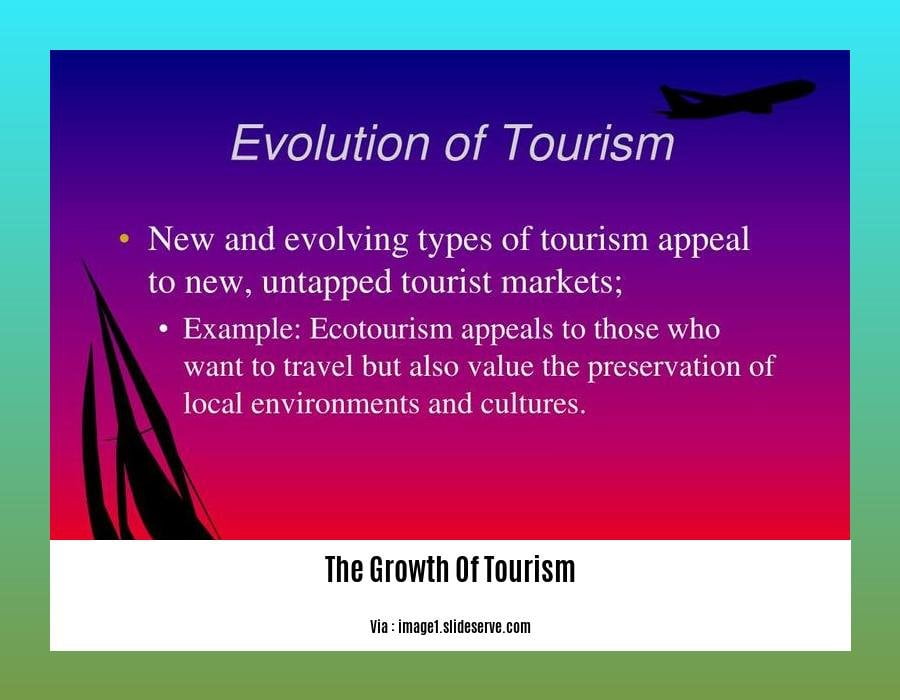
The exponential growth of tourism has undeniable environmental implications that demand our attention. As this industry flourishes, it has a paradoxical effect on the natural resources it relies upon.
While tourism generates revenue and economic opportunities, it can also strain ecosystems. The construction of hotels and resorts, for instance, often involves deforestation and habitat destruction. The increase in transportation and tourism-related activities can lead to air and water pollution.
The depletion of natural resources, such as water and energy, is another concern. Mass tourism can put stress on local water supplies, while the use of energy-intensive activities, like air travel and air conditioning, contribute to greenhouse gas emissions.
How Does Tourism Affect the Environment?
Tourism’s environmental impact can be multifaceted:
- Air pollution: Emissions from transportation, especially air travel, contribute to air pollution.
- Water pollution: Untreated wastewater from hotels and resorts can contaminate water bodies.
- Deforestation: Land clearing for tourism development can result in habitat loss and deforestation.
- Waste generation: Increased tourism leads to more waste, which can strain waste management systems.
- Biodiversity loss: Tourism activities can disrupt wildlife habitats and contribute to biodiversity loss.
Key Takeaways:
- Tourism can simultaneously drive economic growth and environmental degradation.
- The expansion of tourism puts a strain on natural resources, including water, energy, and land.
- Tourism activities can contribute to air pollution, water pollution, and deforestation.
- Sustainable tourism practices are crucial to mitigate the environmental impact of tourism.
Sources:
- Environmental Impacts of Tourism – ResearchGate
- Tourism and Environment – ResearchGate
Technological Advancements and Tourism
Welcome, fellow wanderlusts! As the travel landscape evolves at lightning speed, Technological Advancements and Tourism are shaping the industry in unprecedented ways. Let’s dive right into the transformative impact of technology on our beloved wanderlust.
Mobile Tech: Your Pocket Guide to the World
Smartphones, tablets, and laptops have become indispensable travel companions. Access a wealth of information, seamlessly book flights and accommodations, and navigate foreign lands with ease. These mobile marvels have revolutionized the way we plan and experience our adventures.
Digitalization: The Key to Convenience
The digitalization of tourism has made travel more accessible and convenient. Travelers can now book entire trips online, access real-time updates on flight delays, and communicate with locals and fellow travelers effortlessly. Technology has broken down barriers, making the world a more connected place.
AI: Unveiling the Future of Travel
Artificial Intelligence (AI) is emerging as a game-changer in tourism. From personalized recommendations to automated customer service, AI is enhancing the traveler experience in countless ways. Get ready to embrace a future where AI assists you in crafting your dream itinerary.
Key Takeaways:
- Mobile technology provides real-time access to information and seamless trip planning.
- Digitalization has transformed tourism into a highly accessible and convenient industry.
- AI is revolutionizing the traveler experience with personalized recommendations and automated assistance.
Relevant Sources:
- Impact of Technology on Travel and Tourism – Statistics & Facts
- Digitalization of the Tourism Industry: What Are the Benefits?
Future Trends and Challenges
Travel and tourism are evolving rapidly, and the future holds incredible growth potential. We’re on the cusp of exciting future trends that will redefine how we travel and experience destinations.
Key Megatrends Shaping the Future
Technology: Digitalization continues to transform tourism, empowering travelers with instant access to information and seamless booking experiences. Artificial intelligence (AI) is emerging as a game-changer, offering personalized recommendations and enhancing destination management.
Sustainability: Environmental concerns are driving a shift towards responsible tourism. Travelers seek immersive experiences that minimize their carbon footprint and support local communities. Destinations are working to balance tourism development with conservation efforts.
Inclusivity: The future of tourism is all about creating accessible and welcoming experiences for all. Diverse perspectives and stories are celebrated, and accessibility features are incorporated to cater to travelers with disabilities.
Challenges to Navigate
Along with these promising trends come challenges that need to be addressed.
Skills Gap: The industry is facing a shortage of skilled professionals. Addressing this gap requires investment in education and training to equip tourism workers with the necessary knowledge and digital literacy.
Climate Change: Rising sea levels and extreme weather events pose significant threats to coastal and island destinations. Mitigating these impacts requires collaboration among stakeholders and investment in sustainable infrastructure.
Key Takeaways:
- Technology: Digitalization and AI are shaping the future of travel, offering convenience and personalized experiences.
- Sustainability: Responsible tourism practices are gaining importance, emphasizing environmental conservation and community support.
- Inclusivity: Creating welcoming experiences for all travelers is essential for a thriving tourism industry.
- Skills Gap: Addressing the shortage of skilled professionals is crucial for sustained growth.
- Climate Change: Mitigating the impacts of climate change requires collaboration and investment in sustainable practices.
Relevant URL Sources:
- Future of Tourism: Tech, Staff, and Customers
- The Future of Travel and Tourism as per 4 Sector Leaders
FAQ
Q1: What are the key factors driving the growth of tourism?
A1: Increased leisure time, greater awareness, increased life expectancy, greater affluence, and travel affordability are the key factors driving tourism growth.
Q2: How does tourism contribute to economic development?
A2: Tourism contributes to economic development through revenue generation, job creation, and infrastructure development.
Q3: What are the challenges facing the tourism industry?
A3: The tourism industry faces challenges such as the pandemic, sustainability, and digitalization.
Q4: How does technology impact the tourism industry?
A4: Technology transforms the tourism industry by providing real-time access to information, enabling seamless booking and communication, and emerging trends like AI.
Q5: What are the key trends shaping the future of tourism?
A5: Inclusivity, sustainability, resilience, climate change, urbanization, and digitalization are key trends shaping the future of tourism.
- Unlock Water’s Symbolism: A Cross-Cultural Exploration - April 20, 2025
- Identify Black and White Snakes: Venomous or Harmless? - April 20, 2025
- Unlocking Potential: Origins High School’s NYC Story - April 20, 2025
